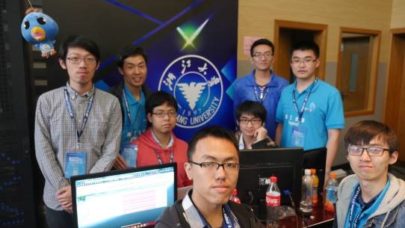
OCF Delivers Huawei-Made HPC ‘Rocket’ for UK University
July 5, 2018
Newcastle University's first institution-wide service for high-performance computing is up and running based on a new HPC cluster called Rocket, designed and co Read more…

Zhejiang University Sets New Student Cluster LINPACK Record: 12 Teraflops
April 20, 2016
At 11:30 am local time on Wednesday in Wuhan, China, Zhejiang University was declared the winner of the High Performance LINPACK (HPL) benchmark portion of the Read more…

Cluster Lifecycle Management: Capacity Planning and Reporting
May 8, 2015
In the previous Cluster Lifecycle Management column, I discussed the best practices for proper care and feeding of your cluster to keep it running smoothly on a Read more…

Care and Feeding of Your Cluster
February 23, 2015
In the previous Cluster Lifecycle Management column, I described the crucial steps that should be taken to deploy and validate your new cluster. In this column, Read more…

FhGFS Designed for Scalability, Flexibility in HPC Clusters
July 24, 2013
When researchers in Germany sat down nearly a decade ago to create a brand new parallel file system for HPC clusters, they had three goals: maximum scalability, maximum flexibility, and ease of use. What they came up with was the Fraunhofer Parallel File System (FhGFS), which is now in use on supercomputers. Read more…

New HPC Cluster Frees Scottish Researchers From Administrative Burden
July 22, 2013
The University of Aberdeen has gone live with Maxwell, a new HPC cluster from Dell that will provide researchers with a faster, more centralized, and easier to manage HPC resource than the university previously had. The system is slated to begin a new era of cross-department collaboration and scientific discovery at the 518-year-old Scottish university. Read more…

HPC Center Meets Green Mandate
April 24, 2013
For HPC centers all over the world, providing high-levels of compute power is job number one, but they also must be as energy-efficient as possible. Read more…

Simplifying Cluster Management…
April 22, 2013
Higher education and research institutes around the globe are investing in HPC clusters, yet there is an all-too-common oversight during the product acquisition process… Read more…

- Click Here for More Headlines

Whitepaper
Transforming Industrial and Automotive Manufacturing
In this era, expansion in digital infrastructure capacity is inevitable. Parallel to this, climate change consciousness is also rising, making sustainability a mandatory part of the organization’s functioning. As computing workloads such as AI and HPC continue to surge, so does the energy consumption, posing environmental woes. IT departments within organizations have a crucial role in combating this challenge. They can significantly drive sustainable practices by influencing newer technologies and process adoption that aid in mitigating the effects of climate change.
While buying more sustainable IT solutions is an option, partnering with IT solutions providers, such and Lenovo and Intel, who are committed to sustainability and aiding customers in executing sustainability strategies is likely to be more impactful.
Learn how Lenovo and Intel, through their partnership, are strongly positioned to address this need with their innovations driving energy efficiency and environmental stewardship.
Download Now
Sponsored by Lenovo
Whitepaper
How Direct Liquid Cooling Improves Data Center Energy Efficiency
Data centers are experiencing increasing power consumption, space constraints and cooling demands due to the unprecedented computing power required by today’s chips and servers. HVAC cooling systems consume approximately 40% of a data center’s electricity. These systems traditionally use air conditioning, air handling and fans to cool the data center facility and IT equipment, ultimately resulting in high energy consumption and high carbon emissions. Data centers are moving to direct liquid cooled (DLC) systems to improve cooling efficiency thus lowering their PUE, operating expenses (OPEX) and carbon footprint.
This paper describes how CoolIT Systems (CoolIT) meets the need for improved energy efficiency in data centers and includes case studies that show how CoolIT’s DLC solutions improve energy efficiency, increase rack density, lower OPEX, and enable sustainability programs. CoolIT is the global market and innovation leader in scalable DLC solutions for the world’s most demanding computing environments. CoolIT’s end-to-end solutions meet the rising demand in cooling and the rising demand for energy efficiency.
Download Now
Sponsored by CoolIT
Advanced Scale Career Development & Workforce Enhancement Center
Featured Advanced Scale Jobs:
HPCwire Resource Library
HPCwire Product Showcase
© 2024 HPCwire. All Rights Reserved. A Tabor Communications Publication
HPCwire is a registered trademark of Tabor Communications, Inc. Use of this site is governed by our Terms of Use and Privacy Policy.
Reproduction in whole or in part in any form or medium without express written permission of Tabor Communications, Inc. is prohibited.
























